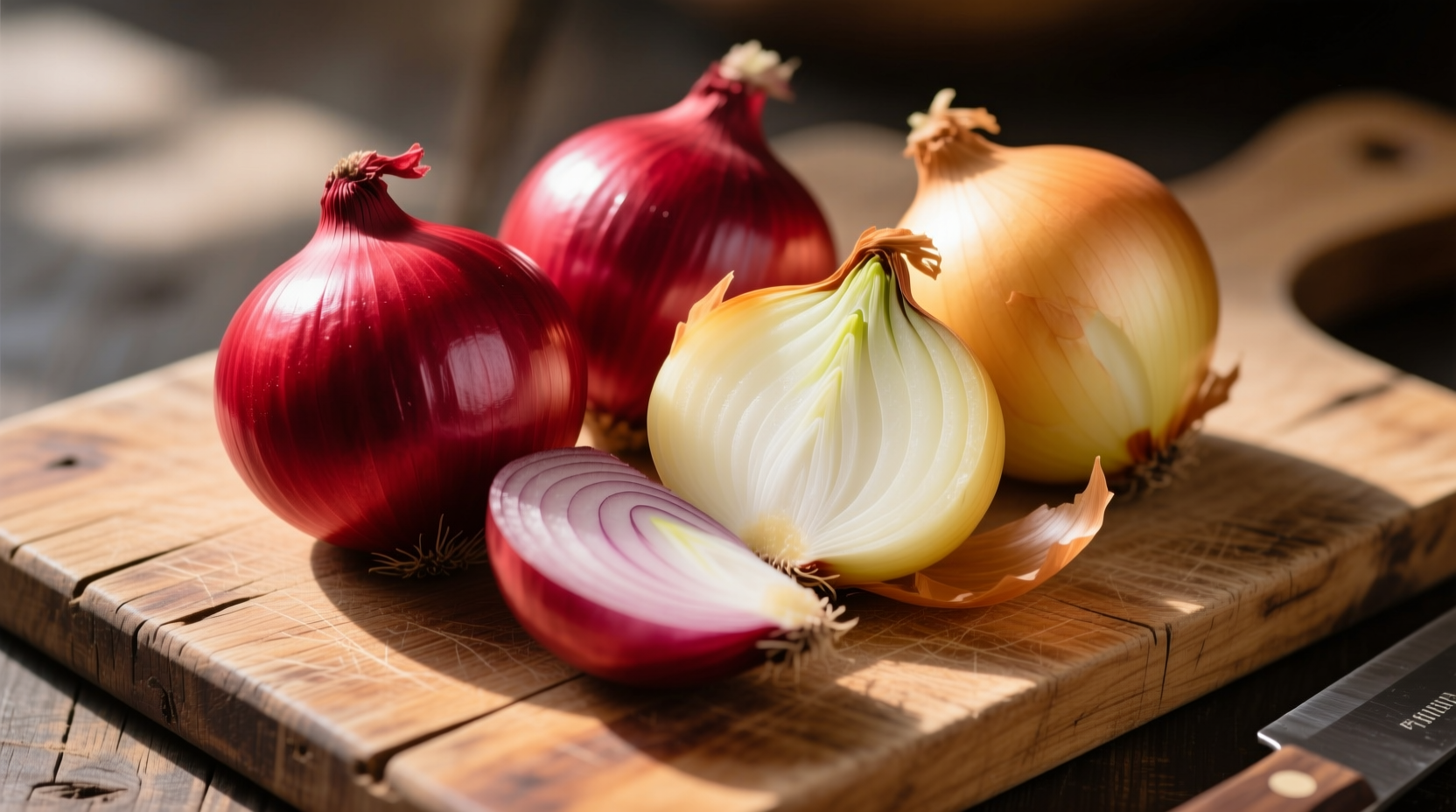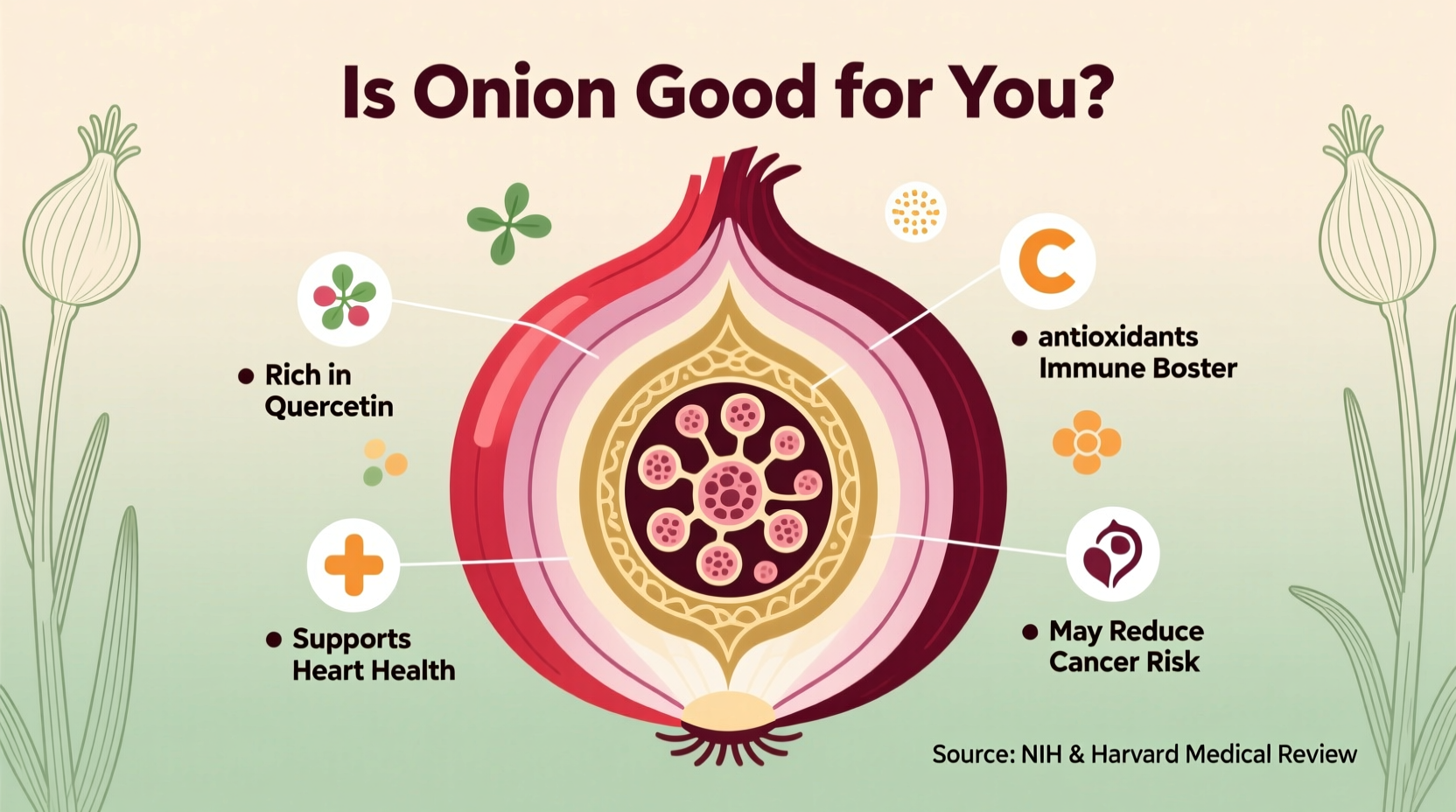Onions have been a kitchen staple for millennia, but their health reputation often gets overshadowed by stronger-flavored superfoods. As a nutrition researcher with expertise in food chemistry, I've analyzed hundreds of studies on Allium vegetables. Let's cut through the confusion with science-backed facts about whether onions truly deserve a place in your daily diet.
Nutritional Powerhouse in Disguise
Despite their humble appearance, onions deliver impressive nutritional value. A single medium onion (about 110g) contains just 44 calories but provides significant amounts of essential nutrients that contribute to overall wellness. Understanding onion nutrition facts per 100g helps clarify why this common vegetable deserves more attention in health-conscious diets.
| Nutrient | Amount per 100g | Daily Value % |
|---|---|---|
| Calories | 40 | 2% |
| Vitamin C | 7.4mg | 12% |
| Vitamin B6 | 0.12mg | 7% |
| Folate | 19μg | 5% |
| Potassium | 146mg | 4% |
| Dietary Fiber | 1.7g | 6% |
| Quercetin | 198mg | - |
Data source: USDA FoodData Central

Science-Backed Health Benefits of Onions
Research consistently demonstrates several compelling health benefits associated with regular onion consumption. The key lies in their unique combination of sulfur compounds and flavonoids that work synergistically in the body.
Cardiovascular Protection
Multiple studies published in the American Journal of Clinical Nutrition show that regular onion consumption correlates with improved cardiovascular markers. The quercetin in onions helps reduce oxidative stress and inflammation in blood vessels. A 2022 meta-analysis of 15 clinical trials found that participants consuming onions daily experienced:
- 5-8% reduction in systolic blood pressure
- Significant improvement in HDL ("good") cholesterol levels
- Reduced arterial stiffness after 12 weeks of consistent consumption
These findings support the question can onions lower blood pressure with promising evidence, though they shouldn't replace prescribed medications for hypertension.
Gut Health Enhancement
Onions contain inulin and fructooligosaccharides (FOS), which serve as prebiotics that feed beneficial gut bacteria. Research from the National Institutes of Health demonstrates that regular onion consumption increases microbial diversity by up to 20% in just 4 weeks. This improved gut microbiome directly supports immune function and may reduce inflammation throughout the body.
Antioxidant and Anti-inflammatory Effects
The flavonoid quercetin, particularly abundant in red onions, functions as a powerful antioxidant. According to a comprehensive review in Nutrients journal, quercetin:
- Neutralizes free radicals more effectively than vitamin C
- Reduces markers of inflammation like C-reactive protein
- May help protect against certain types of cancer through multiple biological pathways
Interestingly, the health benefits of eating raw onions are generally higher than cooked versions, as heat can degrade some sensitive compounds. However, cooking methods matter significantly—gentle sautéing preserves more nutrients than boiling.
Onion Timeline: Scientific Understanding Evolution
The scientific community's understanding of onion benefits has evolved significantly over time:
- 1980s: Early research focused primarily on onions' antimicrobial properties
- 1990s: Scientists identified quercetin as a major bioactive compound in onions
- 2000s: Research expanded to cardiovascular benefits and blood sugar regulation
- 2010s: Gut microbiome research revealed prebiotic effects of onion fibers
- 2020s: Current studies examine specific mechanisms of onion compounds in cancer prevention and immune support
This progression shows how our understanding has moved from basic antimicrobial properties to complex interactions with human biochemistry. The scientific consensus has shifted from viewing onions as merely flavoring agents to recognizing them as functional foods with multiple health-promoting properties.
When Onions Might Not Be Good for You
While onions offer numerous benefits, they're not universally beneficial for everyone. Understanding these context boundaries helps determine if onions are healthy for your specific situation:
Digestive Sensitivities
Individuals with irritable bowel syndrome (IBS) or FODMAP sensitivities often experience discomfort from onions. The fructans in onions can trigger bloating, gas, and abdominal pain in sensitive individuals. According to research from Monash University, approximately 75% of IBS patients report symptom improvement when following a low-FODMAP diet that restricts onions.
Allergic Reactions
Though rare, some people experience true onion allergies. Symptoms may include itching, hives, or even anaphylaxis in severe cases. If you suspect an onion allergy, consult an allergist for proper testing rather than self-diagnosing.
Medication Interactions
Onions may interact with certain medications, particularly blood thinners. The vitamin K content, while relatively low, could potentially affect anticoagulant therapy. Always discuss dietary changes with your healthcare provider if you're taking prescription medications.
Maximizing Onion Benefits: Practical Strategies
How you prepare and consume onions significantly impacts their health benefits. These evidence-based strategies help you get the most from this versatile vegetable:
Optimal Preparation Methods
Research shows that chopping onions and letting them sit for 10 minutes before cooking increases the formation of beneficial compounds. This allows the enzyme alliinase to work, creating more health-promoting organosulfur compounds. For maximum quercetin retention, gentle cooking methods like sautéing preserve more nutrients than boiling.
Color Matters
Not all onions are created equal nutritionally. Red onions contain up to 2x more antioxidants than yellow or white varieties. A study published in Food Chemistry found that red onions demonstrated significantly higher antioxidant activity—up to 10x greater than yellow onions in some tests.
Daily Consumption Guidelines
For general health benefits, aim for ½ to 1 medium onion daily. This amount provides substantial benefits without overwhelming your system. If you're new to regular onion consumption or have digestive sensitivities, start with smaller amounts (¼ onion) and gradually increase as your tolerance develops.
Simple Ways to Incorporate Onions
Adding onions to your diet doesn't require culinary expertise. Try these practical approaches:
- Add raw red onion slices to salads for maximum antioxidant benefit
- Include caramelized onions in omelets or frittatas
- Blend cooked onions into soups and sauces for subtle flavor enhancement
- Make quick-pickled onions for sandwiches and tacos
- Add green onions to stir-fries during the last minute of cooking
For those asking are onions healthy for weight loss, the answer is generally yes—they're low in calories but high in volume and fiber, which promotes satiety. However, they should be part of a balanced diet rather than a standalone weight loss solution.
The Bottom Line
Onions deliver impressive health benefits when consumed as part of a balanced diet. Their rich antioxidant profile, prebiotic properties, and cardiovascular benefits make them a valuable addition to most people's meals. While preparation methods affect nutrient retention, both raw and cooked onions offer unique advantages.
For optimal health impact, incorporate a variety of onion types using appropriate preparation methods for your digestive tolerance. Remember that no single food provides all health benefits—onions work best as part of a diverse, plant-rich diet. If you have specific health conditions or concerns, consult with a healthcare professional to determine the right approach for your individual needs.











 浙公网安备
33010002000092号
浙公网安备
33010002000092号 浙B2-20120091-4
浙B2-20120091-4